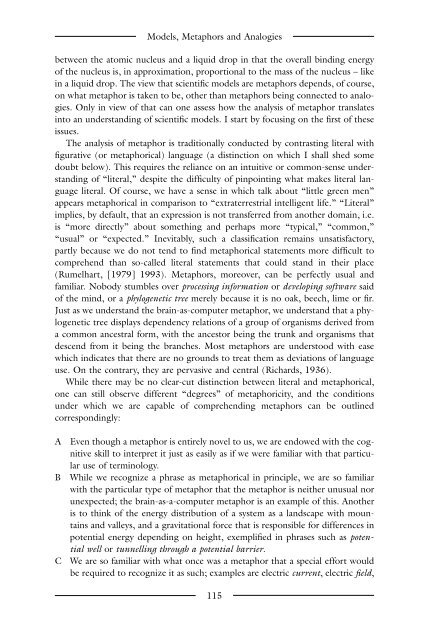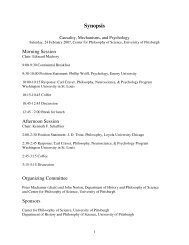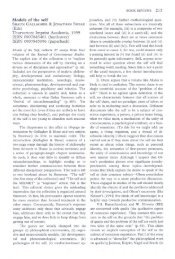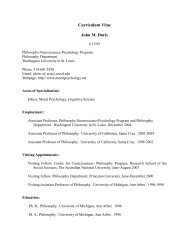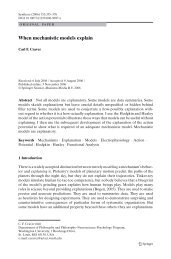The Blackwell Guide to the Philosophy of Science - The Department ...
The Blackwell Guide to the Philosophy of Science - The Department ...
The Blackwell Guide to the Philosophy of Science - The Department ...
Create successful ePaper yourself
Turn your PDF publications into a flip-book with our unique Google optimized e-Paper software.
Models, Metaphors and Analogies<br />
between <strong>the</strong> a<strong>to</strong>mic nucleus and a liquid drop in that <strong>the</strong> overall binding energy<br />
<strong>of</strong> <strong>the</strong> nucleus is, in approximation, proportional <strong>to</strong> <strong>the</strong> mass <strong>of</strong> <strong>the</strong> nucleus – like<br />
in a liquid drop. <strong>The</strong> view that scientific models are metaphors depends, <strong>of</strong> course,<br />
on what metaphor is taken <strong>to</strong> be, o<strong>the</strong>r than metaphors being connected <strong>to</strong> analogies.<br />
Only in view <strong>of</strong> that can one assess how <strong>the</strong> analysis <strong>of</strong> metaphor translates<br />
in<strong>to</strong> an understanding <strong>of</strong> scientific models. I start by focusing on <strong>the</strong> first <strong>of</strong> <strong>the</strong>se<br />
issues.<br />
<strong>The</strong> analysis <strong>of</strong> metaphor is traditionally conducted by contrasting literal with<br />
figurative (or metaphorical) language (a distinction on which I shall shed some<br />
doubt below). This requires <strong>the</strong> reliance on an intuitive or common-sense understanding<br />
<strong>of</strong> “literal,” despite <strong>the</strong> difficulty <strong>of</strong> pinpointing what makes literal language<br />
literal. Of course, we have a sense in which talk about “little green men”<br />
appears metaphorical in comparison <strong>to</strong> “extraterrestrial intelligent life.” “Literal”<br />
implies, by default, that an expression is not transferred from ano<strong>the</strong>r domain, i.e.<br />
is “more directly” about something and perhaps more “typical,” “common,”<br />
“usual” or “expected.” Inevitably, such a classification remains unsatisfac<strong>to</strong>ry,<br />
partly because we do not tend <strong>to</strong> find metaphorical statements more difficult <strong>to</strong><br />
comprehend than so-called literal statements that could stand in <strong>the</strong>ir place<br />
(Rumelhart, [1979] 1993). Metaphors, moreover, can be perfectly usual and<br />
familiar. Nobody stumbles over processing information or developing s<strong>of</strong>tware said<br />
<strong>of</strong> <strong>the</strong> mind, or a phylogenetic tree merely because it is no oak, beech, lime or fir.<br />
Just as we understand <strong>the</strong> brain-as-computer metaphor, we understand that a phylogenetic<br />
tree displays dependency relations <strong>of</strong> a group <strong>of</strong> organisms derived from<br />
a common ancestral form, with <strong>the</strong> ances<strong>to</strong>r being <strong>the</strong> trunk and organisms that<br />
descend from it being <strong>the</strong> branches. Most metaphors are unders<strong>to</strong>od with ease<br />
which indicates that <strong>the</strong>re are no grounds <strong>to</strong> treat <strong>the</strong>m as deviations <strong>of</strong> language<br />
use. On <strong>the</strong> contrary, <strong>the</strong>y are pervasive and central (Richards, 1936).<br />
While <strong>the</strong>re may be no clear-cut distinction between literal and metaphorical,<br />
one can still observe different “degrees” <strong>of</strong> metaphoricity, and <strong>the</strong> conditions<br />
under which we are capable <strong>of</strong> comprehending metaphors can be outlined<br />
correspondingly:<br />
A Even though a metaphor is entirely novel <strong>to</strong> us, we are endowed with <strong>the</strong> cognitive<br />
skill <strong>to</strong> interpret it just as easily as if we were familiar with that particular<br />
use <strong>of</strong> terminology.<br />
B While we recognize a phrase as metaphorical in principle, we are so familiar<br />
with <strong>the</strong> particular type <strong>of</strong> metaphor that <strong>the</strong> metaphor is nei<strong>the</strong>r unusual nor<br />
unexpected; <strong>the</strong> brain-as-a-computer metaphor is an example <strong>of</strong> this. Ano<strong>the</strong>r<br />
is <strong>to</strong> think <strong>of</strong> <strong>the</strong> energy distribution <strong>of</strong> a system as a landscape with mountains<br />
and valleys, and a gravitational force that is responsible for differences in<br />
potential energy depending on height, exemplified in phrases such as potential<br />
well or tunnelling through a potential barrier.<br />
C We are so familiar with what once was a metaphor that a special effort would<br />
be required <strong>to</strong> recognize it as such; examples are electric current, electric field,<br />
115


